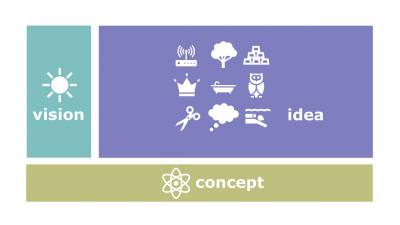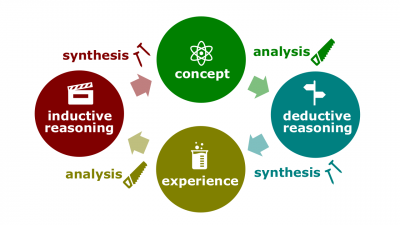Difference between revisions of "Concept"
(Created page with "400px|thumb|right|[[Concept]]Concept is an abstract idea or a vision; a general notion. In philosophy, a mental model of something. When b...") |
|||
| Line 6: | Line 6: | ||
*[[Scenario]]. (1) An [[idea]] of what the future can possibly be; (2) An [[idea]] for a possible series of actions or tasks that respond to an [[event]]. Each [[scenario]] is an instance of a [[use case]]. | *[[Scenario]]. (1) An [[idea]] of what the future can possibly be; (2) An [[idea]] for a possible series of actions or tasks that respond to an [[event]]. Each [[scenario]] is an instance of a [[use case]]. | ||
| − | ==Related | + | ==Related lectures== |
*[[Idea Generation Quarter]]. | *[[Idea Generation Quarter]]. | ||
[[Category: Septem Artes Administrativi]][[Category: Articles]] | [[Category: Septem Artes Administrativi]][[Category: Articles]] | ||
Revision as of 11:30, 4 January 2019
Concept is an abstract idea or a vision; a general notion. In philosophy, a mental model of something. When being shortened from a concept vehicle and similar grammatical constructions, an experimental model produced in order to test the viability of new design features and to use in public relations.
Related concepts
- Idea (from Greek idein meaning to see). A thought or suggestion as to a possible course of action, as well as the aim or purpose of that course.
- Vision (from Latin videre meaning to see; sometimes, referred as a big idea). The capacity or state of being capable to see a new product concept or a new way of living or doing business, or an experience of seeing someone or something in a dream or hopeful thinking. When implemented, a vision could lead to disruptive innovation. In enterprise administration, a vision can also refer to a long-term strategy for attaining a goal or goals and be expressed in the vision statement.
- Scenario. (1) An idea of what the future can possibly be; (2) An idea for a possible series of actions or tasks that respond to an event. Each scenario is an instance of a use case.

